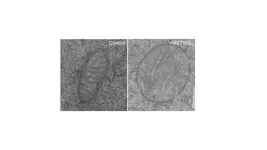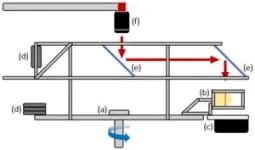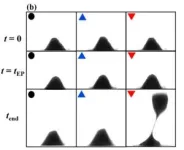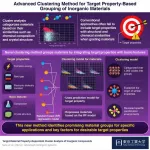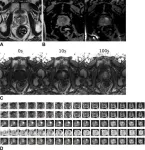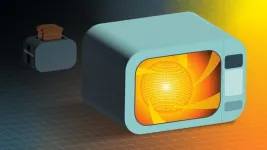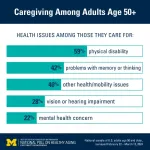(Press-News.org) **EMBARGOED FOR RELEASE UNTIL AUG. 6 AT 11 A.M. ET**
A protein called Meteorin-like (METRNL) in the tumor microenvironment saps energy from T cells, thereby severely limiting their ability to fight cancer, according to new research directed by investigators at the Johns Hopkins University School of Medicine and the Johns Hopkins Kimmel Cancer Center and its Bloomberg~Kimmel Institute for Cancer Immunotherapy. Finding ways to block the effects of METRNL signaling on tumor-infiltrating T cells may allow these immune cells to regain the energy necessary to eliminate tumors.
A report about the work was published Aug. 6 in the journal Immunity.
METRNL has been described in the medical literature before — initially as playing a role in helping keep cold or exercising animals (and people) warm by poking holes in the mitochondria (energy factory) of fat cells so they produce heat. However, it had not previously been known to be active in cancer or in T cells, says lead study author Christopher Jackson, M.D., an assistant professor of neurosurgery at Johns Hopkins.
When T cells try to eliminate a tumor, the state of chronic stimulation/stress causes them to secrete METRNL, Jackson explains. Once METRNL is secreted, it interacts with the mitochondria and pokes holes in the electron transport chain, a cluster of proteins participating in a process to create energy. When T cells can no longer keep up with their energy requirements, they stop trying to kill cancer cells, which enables cancer cells to multiply and spread.
“Others have shown that metabolic dysfunction limits T cells’ ability to fight cancer, but we are among the first to describe a discrete signaling pathway that causes that to happen,” Jackson says. “Most of the previous work has looked at how the lack of specific nutrients in tumors limits a T cell’s ability to function. The problem is this is difficult to modify because it’s hard to get the right nutrients into a tumor and direct them to T cells. We potentially can do much better by targeting a signaling pathway because we can block it or turn it on or off, but until now, nobody had identified such a pathway that restores the metabolic health of T cells in tumors.”
In a series of laboratory investigations, researchers first studied T cells from the tumor tissue and blood of patients with previously untreated brain tumors (glioblastomas), prostate cancer, bladder cancer and renal cell/kidney cancer, and performed RNA sequencing to try to identify genes responsible for dysfunction in the tumor. METRNL was the gene most highly expressed.
Next, they wanted to find out what makes T cells secrete METRNL in the first place, discovering that the reason was chronic stimulation. Normally, the immune system activates when stimulated to fight an infection and then diminishes when that illness resolves. But in the setting of cancer, T cells are chronically stimulated, which causes them to become dysfunctional. METRNL also was found to be secreted by other immune cells in tumors such as macrophages and dendritic cells, but it acts specifically on T cells.
Additional study determined that METRNL acts directly on the mitochondria, and decouples the electron transport chain. As T cells lose energy and start to fail, they increase their attempts to use glucose (natural sugar) as a backup source of energy. But, because the tumor environment is low in glucose, they continue to flounder and eventually die. This is one of the ways that tumors can continue to grow. Deleting METRNL in models of different cancer types in the researchers’ investigations universally delayed tumor growth.
Finally, researchers observed that METRNL is activated through a family of transcription factors (proteins that control the rate of transcription of genetic information from DNA to RNA) called E2F, that it is dependent on signaling by a receptor called PPAR delta, and that modulating these factors downstream can block the effects of METRNL.
The next steps are to determine how this can help patients, Jackson says. He and his colleagues are actively working on different means to target the METRNL-E2F-PPAR delta pathway or to combine targeted treatment with other immunotherapies.
“We think that one of the reasons that some current immunotherapies fail is they require more energy from immune cells that already are functioning at decreased capacity,” he says. “Blocking the pathway may allow these immunotherapies that maybe have not been effective in the past to be more effective because there will be enough fuel for the T cells to meet that increased demand.”
Study co-authors were Ayush Pant, Aanchal Jain, Eli Yazigi, Liang Zhao, Thomas Nirschl, Christina Kochel, Denis Routkevitch, Kisha Patel, Stephany Tzeng, Sarah Neshat, Barbara Smith, Jordan Green, Chetan Bettegowda, Henry Brem and Drew Pardoll of Johns Hopkins. Additional study co-authors who were at Johns Hopkins at the time the research was conducted were Wikum Dinalankara and Luigi Marchionni of Weill Cornell Medicine in New York, Charles Drake of Janssen Research and Michael Lim of Stanford School of Medicine in Palo Alto, California. Other investigators from Stanford and Asan Medical Center in Seoul, South Korea, contributed to the project.
RNA sequencing was supported by grants through the Bristol Myers Squibb International Immuno-Oncology Network and Janssen Pharmaceuticals. Dinalankara and Marchionni were supported by the National Institutes of Health-National Cancer Institute award R01CA200859.
Jackson is a consultant for Egret Therapeutics with equity interests in the company. He is an inventor on a patent filed by The Johns Hopkins University for using immune checkpoint agonists to treat cerebrovascular disorders. He receives research support from Biohaven, InCephalo and Grifols. His work is funded by philanthropy and the Goldhirsh-Yellin Foundation. The Johns Hopkins University has filed a provisional patent on METRNL blockade for cancer treatment, on which Jackson, Pant, Brem and others are inventors.
Additionally, Bettegowda is a consultant for Depuy-Synthes and Bionaut Labs. Brem is a consultant for Perosphere, AsclepiX Therapeutics, StemGen, Accelerating Combination Therapies, Catalio Nexus Fund II LLC, LikeMinds Inc., Acuity Bio Corp., InSightec, Galen Robotics and Nurami Medical. These relationships are managed by The Johns Hopkins University in accordance with its conflict-of-interest policies.
END
Meteorin-like protein drains energy from T cells, limiting immune system’s power to fight cancer
2024-08-06
ELSE PRESS RELEASES FROM THIS DATE:
Live longer, die healthier
2024-08-06
Everyone wants to live to a ripe old age, but no one wants to be decrepit. Now, University of Connecticut researchers have demonstrated a treatment that could lengthen life—and vigor—up to the very end.
Even as human lifespans have lengthened over the past century, most people in old age suffer a serious health decline in the last decade of life. Chronic illnesses such as cancer, diabetes, or cardiovascular disease may begin, followed by frailty. Many interventions can prolong life, but not necessarily good health. And nobody wants to spend the last ...
Novel machine learning-based cluster analysis method that leverages target material property
2024-08-06
In materials science, substances are often classified based on defining factors such as their elemental composition or crystalline structure. This classification is crucial for advances in materials discovery, as it allows researchers to identify promising classes of materials and explore new ones with similar functions and properties. A recent Advanced Intelligent Systems study led by Researcher Nobuya Sato and Assistant Professor Akira Takahashi from Tokyo Institute of Technology developed a new machine learning-powered clustering technique. This technique groups similar materials by taking into account both their ...
CT health screening can identify diabetes risk
2024-08-06
OAK BROOK, Ill. – Analysis of CT scans in people who undergo imaging for health screening can identify individuals at risk of type 2 diabetes, according to a study published today in Radiology, a journal of the Radiological Society of North America (RSNA). Researchers said the findings underscore CT’s value in opportunistic imaging—the use of information from routine imaging examinations to learn more about a patient’s overall health.
For the new study, researchers evaluated the ability of automated CT-derived markers ...
AI model effective in detecting prostate cancer
2024-08-06
OAK BROOK, Ill. – A deep learning model performs at the level of an abdominal radiologist in the detection of clinically significant prostate cancer on MRI, according to a study published today in Radiology, a journal of the Radiological Society of North America (RSNA). The researchers hope the model can be used as an adjunct to radiologists to improve prostate cancer detection.
Prostate cancer is the second most common cancer in men worldwide. Radiologists typically use a technique that combines different MRI sequences (called multiparametric MRI) to diagnose clinically significant prostate cancer. ...
Exposure to wildfire smoke may affect patients undergoing surgery
2024-08-06
CHICAGO – Nearly 100 wildfires are currently raging throughout the country, burning more than 2 million acres. The rising frequency of these fires poses a special concern for anesthesiologists – the potential for increased rates of adverse outcomes from anesthesia and surgery among patients exposed to wildfire smoke, according to a special article in the Online First edition of Anesthesiology, the peer-reviewed journal of the American Society of Anesthesiologists (ASA).
"Wildfire smoke causes inflammation and is known to worsen heart and lung disease and pregnancy outcomes," said senior author Vijay Krishnamoorthy, M.D., M.P.H., Ph. D., chief of the Critical Care ...
Visiting an art exhibition can make you think more socially and openly. But for how long?
2024-08-06
A new study by an international team of collaborators led by researchers at the University of Vienna, and in collaboration with the Dom Museum Wien, aimed to address the questions of whether art exhibitions can make us more empathic or even change our attitudes and behaviors? The researchers were able to show that, indeed, looking through the exhibition reduced xenophobia and increased acceptance of immigration. Even more, by employing a new cellphone-based experience sampling method, they could track how long ...
Heating for fusion: Why toast plasma when you can microwave it!
2024-08-06
Some believe the future of fusion in the U.S. lies in compact, spherical fusion vessels. A smaller tokamak, it is thought, could offer a more economical fusion option. The trick is squeezing everything into a small space. New research suggests eliminating one major component used to heat the plasma, freeing up much-needed space.
Scientists at the U.S. Department of Energy’s (DOE) Princeton Plasma Physics Laboratory (PPPL), the private company Tokamak Energy and Kyushu University in Japan have proposed a design for a compact, spherical fusion pilot plant ...
Nudges fail to motivate vaccination
2024-08-06
One popular strategy to motivate people to get vaccinated is the nudge—a message designed to take advantage of human tendencies to conform to social norms, seek to protect loved ones or community, and to prefer treatments with high efficacy rates. Jiseon Chang and colleagues sought to assess the efficacy of such nudges in real world contexts during the COVID-19 pandemic. The authors paid for ads to appear on Facebook between October 2021 and January 2022, reaching almost 15 million users in Brazil, Russia, South Africa, Taiwan, ...
Caregiving: Poll reveals who’s providing care and who they’re caring for
2024-08-06
More than 1 in 4 people age 50 and older helps take care of at least one family member or friend who has a health problem or disability, a new poll finds.
And among those caregivers, the new results from the University of Michigan National Poll on Healthy Aging reveal a lot about who they are and who they’re caring for.
In all, 30% of all people in their 50s and early 60s provide care to at least one person with a health issue or disability, compared with 23% of people over 65. And 1 in 10 caregivers in their 50s and early 60s are juggling taking care of three or more people.
In ...
To predict tax revenue, look at corporate earnings
2024-08-06
To Predict Tax Revenue, Look at Corporate Earnings
States can make more accurate budget forecasts and avoid midyear cuts if they include growth in corporate earnings
AUSTIN, Texas -- In the complex task of building a state budget, much rides on the accuracy of its fiscal crystal ball: its forecast of how much tax revenue will come in to fund services during the year ahead. Forecasting errors have increased since 2001 due to revenue volatility, such as wider swings in personal income and consumer spending.
New research from Texas ...
